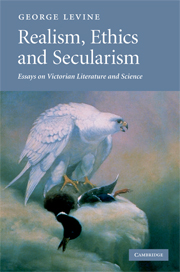Book contents
- Frontmatter
- Contents
- Preface
- Introduction
- Part I THE SUBJECT BROACHED: OTHERNESS, EPISTEMOLOGY, AND ETHICS
- Part II ETHICS WITHOUT GOD, OR, CAN “IS” BECOME “OUGHT”?
- Chapter 2 Is life worth living?
- Chapter 3 Ruskin and Darwin and the matter of matter
- Chapter 4 Scientific discourse as an alternative to faith
- Chapter 5 In defense of Positivism
- Chapter 6 Why science isn't literature: the importance of differences
- Part III LITERATURE, SECULARITY, AND THE QUEST FOR OTHERNESS
- Epilogue
- Index
Chapter 4 - Scientific discourse as an alternative to faith
Published online by Cambridge University Press: 22 September 2009
- Frontmatter
- Contents
- Preface
- Introduction
- Part I THE SUBJECT BROACHED: OTHERNESS, EPISTEMOLOGY, AND ETHICS
- Part II ETHICS WITHOUT GOD, OR, CAN “IS” BECOME “OUGHT”?
- Chapter 2 Is life worth living?
- Chapter 3 Ruskin and Darwin and the matter of matter
- Chapter 4 Scientific discourse as an alternative to faith
- Chapter 5 In defense of Positivism
- Chapter 6 Why science isn't literature: the importance of differences
- Part III LITERATURE, SECULARITY, AND THE QUEST FOR OTHERNESS
- Epilogue
- Index
Summary
The enemy of knowledge, as Huxley saw it, was faith: “The man of science has learned to believe in justification, not by faith, but by verification.” Huxley's language shapes itself paradoxically, as the negative form of the language of religion; that is, in its often witty and bitter rejection of religion as a method of knowing, it retains the religious structure and the sanction of feeling that goes with it. The fondest “convictions of barbarous and semi-barbarous people” are the convictions Huxley associates with religion: “that authority is the soundest basis of belief; that merit attaches to a readiness to believe; that the doubting disposition is a bad one, and scepticism a sin.” Huxley assumes “the exact reverse … to be true”. The “semi-barbarous” sounds like the John Henry Newman of the Apologia pro vita sua, published two years before.
“The improver of natural knowledge” Huxley affirms, “absolutely refuses to acknowledge authority, as such. For him, scepticism is the highest of duties; blind faith the one unpardonable sin” (p. 40). The reversal is “exact,” the refusal “absolute,” and faith, in the deliberate paradox, becomes an “unpardonable sin.” Huxley's language deliberately depends upon the mode it is rejecting. Such reversals provide the form of that “naturalizing” of religion of which James Moore has written so incisively and critically.
- Type
- Chapter
- Information
- Realism, Ethics and SecularismEssays on Victorian Literature and Science, pp. 100 - 135Publisher: Cambridge University PressPrint publication year: 2008



